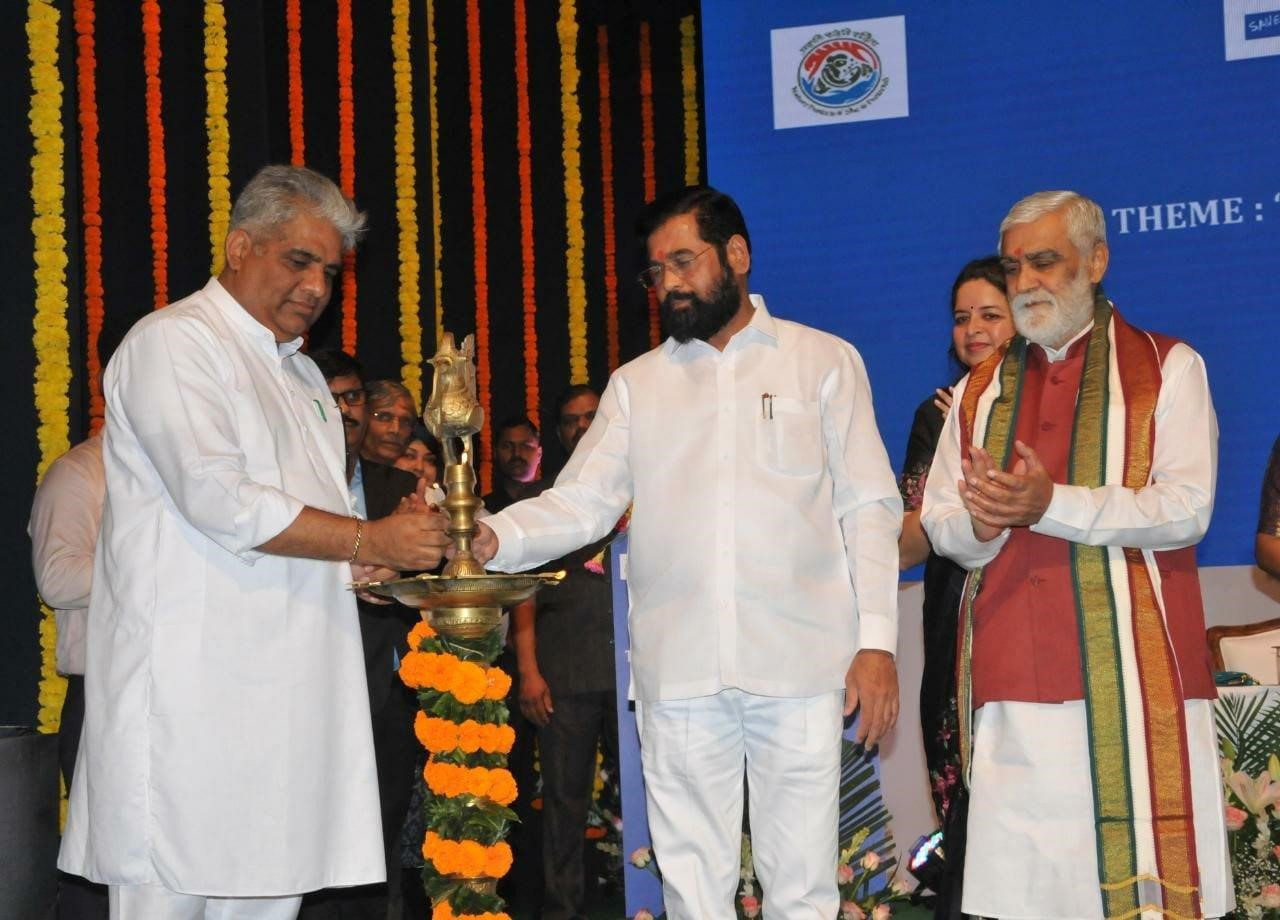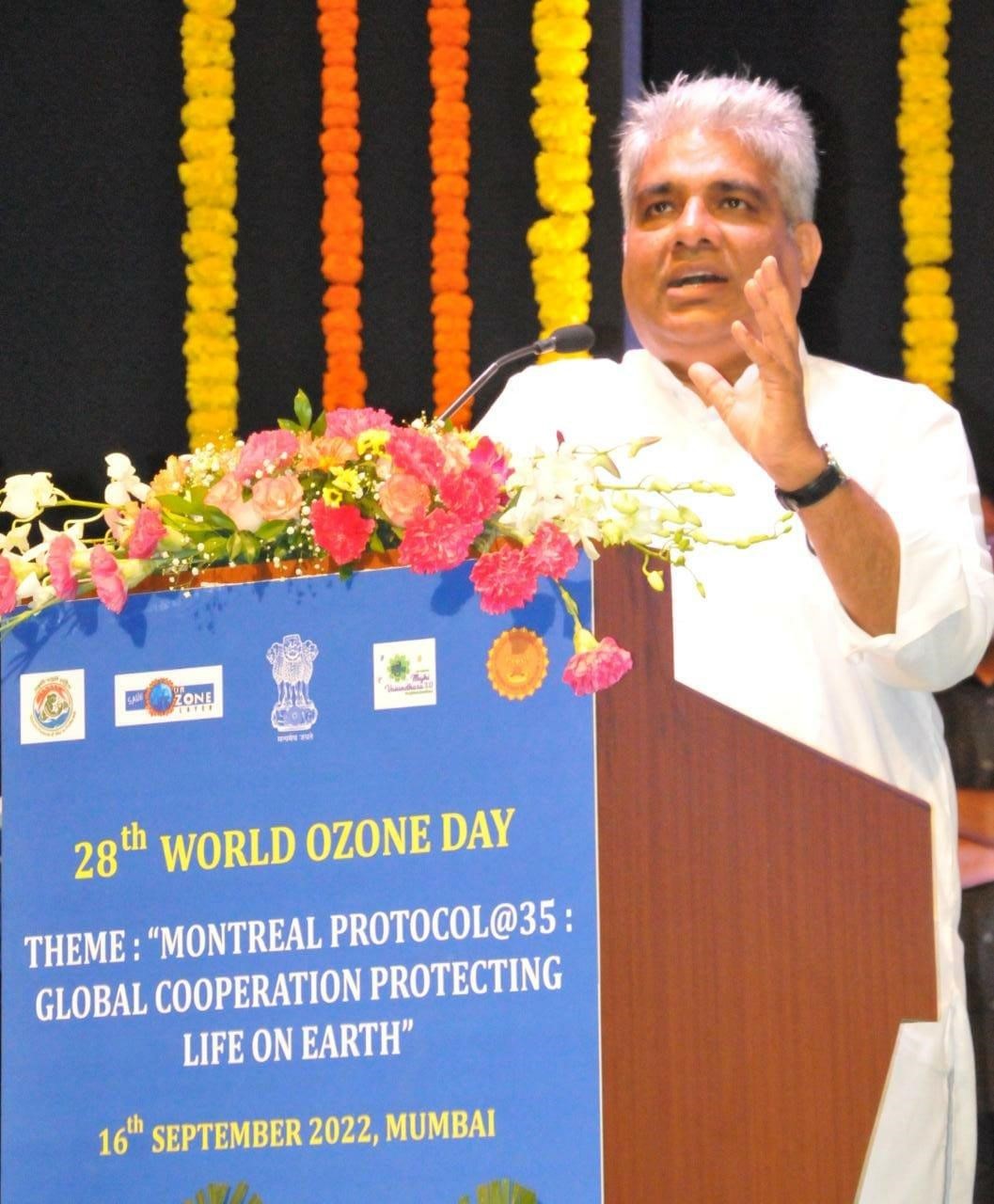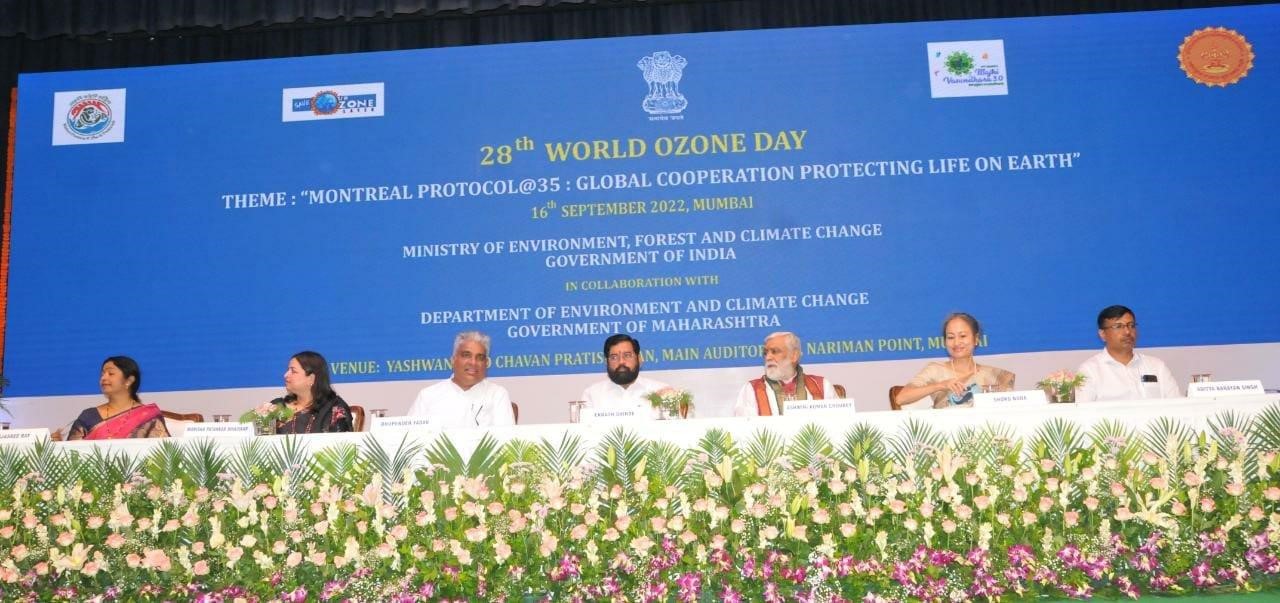India’s contribution to the Montreal Protocol in terms of policy formulation is noteworthy, India has played a proactive role in the phase-out of production and consumption of Ozone Depleting Substances. This was stated by the Union Minister for Environment, Forest and Climate Change and Labour and Employment Bhupendra Yadav at a programme organized to observe the 28th World Ozone Day in Mumbai today. The Maharsahtra Chief Minister Eknath Shinde and Minister of State for Environment, Forest and Climate Change and Consumer Affairs, Food and Public Distribution Ashwini Kumar Choubey were also present on the occasion. The event was organized by the Ministry of Environment, Forest and Climate Change in collaboration with the Department of Environment and Climate Change, Government of Maharashtra.

Speaking on the occasion, the Union Environment Minister said that India has not been a traditional contributor to global emissions, but that in our actions, we are showing the intent to be a problem solver. Stating that the world is facing climate crisis because of wasteful use of energy, the Minister called for adopting the mantra of L.I.F.E (Lifestyle for Environment) which was coined by Prime Minister Narendra Modi, in line with the concept of sustainable lifestyle, encouraging us to adopt mindful and not mindless consumption and utilization of resources.

The Union Minister said that the Prime Minister has again and again focused on mindful consumption, for instance, how to economically use energy in warehouses and refrigeration, which are in line with our fight against climate change. India is among the countries which has stated that the country’s sustainable development will be such that net zero is achieved by 2070, stated Shri Yadav. The Minister also said that India played a key role in the finalization of the Kigali Amendment. After ratifying the same in September 2021, the central government is working towards developing a national strategy, in close consultation with the industry stakeholders, for phasing down Hydrofluorocarbons (HFCs).

The Minister informed that the Ministry will soon be entering into collaboration with eight Indian Institutes of Technology (Bombay, Roorkee, Hyderabad, Kanpur, Guwahati, Banaras, Madras and Delhi) to promote research and development of chemicals with low global warming potential, including blends. These can be used as alternatives to substances controlled under the Montreal Protocol. The collaborative research will be done in line with industry requirements through engagement of research scholars, leading to the development of a robust R&D ecosystem in this area, and will also help promote the Make in India initiative of the Government.
The Minister also highlighted the goals of the India Cooling Action Plan (ICAP), which is a vision document developed by the MoEFCC to provide socio-economic and environmental benefits related to reduced refrigerant use, climate change mitigation and Sustainable Development Goals over the period 2037-38. He highlighted the progress on the implementation of the recommendations.
The Union Minister released the 23rd edition of “The Montreal Protocol: India’s Success Story”. The other publications of the Ozone Cell of the MoEFCC released on the occasion include:
i) Action Plan for implementing the recommendations of the India Cooling Action Plan (ICAP) for the thematic Area Space Cooling in Buildings
ii) Study Report on Public Procurement Policies for Refrigeration and Air-Conditioning (RAC) Equipment using non-ODS based refrigerants
iii) Study Report on Cold Chain sector in India for Promoting non-ODS and Low-GWP Refrigerants
iv) Booklet on Good Servicing Practices for Energy Efficient operation of Room Air conditioners
The winning entries were announced for a national level poster making and slogan writing competition for school children on ‘Save Our Ozone Layer’, which was jointly organized by the National Museum of Natural History and the Ozone Cell of MoEFCC. The Union Minister also released the first prize winning poster on the occasion.
A short video film on India Cooling Action Plan and an animated message on energy-efficient cooling have also been released.
United Nation Development Programme (UNDP)’s India Representative Ms. Shoko Noda and Principal Secretary, Department of Environment & Climate Change, Government of Maharashtra Smt. Manisha Mhaiskar were also present on the occasion. The Regional Director of United Nations Environment Programme (Asia Pacific) Dechen Tsering in a video message said that India has been successful in implementing the programme for Ozone Depleting Substances.
About World Ozone Day
World Ozone Day is celebrated on 16th September each year to commemorate the signing of the Montreal Protocol that came into force on this day in 1987. World Ozone Day is celebrated every year to spread awareness among people about the depletion of Ozone Layer and the measures taken and to be taken to preserve it.
The theme of World Ozone Day 2022 is “Montreal Protocol@35: global cooperation protecting life on earth”.
India’s achievements in Implementation of the Montreal Protocol
India, as Party to the Montreal Protocol since June 1992, has been successfully implementing the Montreal Protocol and projects and activities for phasing out of ozone depleting substances, in line with the phase out schedule of the Protocol.
India phased out Chlorofluorocarbons, Carbon tetrachloride, Halons, Methyl Bromide and Methyl Chloroform for controlled uses as on 1 January 2010, in line with the Montreal Protocol schedule. Currently, Hydrochlorofluorocarbons are being phased out as per the accelerated schedule of the Montreal Protocol.
Hydrochlorofluorocarbons Phase-out Management Plan (HPMP) Stage – I has been successfully implemented from 2012 to 2016 and Hydrochlorofluorocarbons Phase-out Management Plan (HPMP) Stage – II is under implementation since 2017 and will be completed by 2023. Stage III of the HPMP, the last of the HPMPs to phase out remaining HCFCs, will be implemented from 2023 – 2030. The phase-out of HCFCs in all manufacturing sectors, comprising refrigeration and air-conditioning manufacturing sectors, will be completed by 1.1.2025 and the activities relating to the servicing sector will be continued till 2030.
The study on reduction of Greenhouse Gas (GHG) emissions through phase-out of Ozone Depleting Substances (ODS) under the Montreal Protocol implementation in India. The study carried out by the Ministry of Environment, Forest and Climate Change estimates that the reduction of GHG emissions due to phase-out of ODS till 2022 is 465 million tonne C02 equivalent, while it is expected that the reduction of GHG emissions till 2030 is expected to be 778 million tonnes of C02 equivalent.
Implementation of actions emerging from India Cooling Action Plan (ICAP) will supplement efforts in adopting climate-friendly alternatives and promotion of energy efficiency during the implementation of HFC phase-out under the Kigali Amendment. This will significantly contribute to India’s climate action in achieving the net zero emissions by 2070, through the ‘Panchamrits’, committed by the Prime Minister of India, at the Climate Change Conference of Parties in 2021.
****








